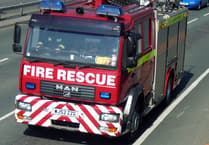MORE evidence about the impacts of potential changes to a first responder scheme on rural areas has been requested by an influential health committee.
South Western Ambulance Service Trust had put forward a plan earlier this year to phase out the system of fire co-responders over 12 months in favour of community first responders, but has seen huge opposition to the move.
Even though there had been some tweaks to its plan – including the removal of a specific deadline by which fire co-responders would be phased out – the ambulance trust boss, Dr John Martin, faced Devon’s health and adult care scrutiny committee for the second time in three months.
Members raised a host of concerns over the 90-minute debate including claims of a lack of robust data to support the proposed changes, fears about response times, and worries that the ambulance trust had overly focused on the risk to its reputation due to any changes rather than the impact on communities.
Fire co-responders are present in 15 of Devon’s on-call fire stations, and the system involves those individuals who have opted to be part of the scheme being dispatched to the most serious medical incidents to ensure patients get the fastest response times.
However, the ambulance trust has been trying to amplify an existing equivalent service that sees trained members of the community become community first responders.
They deal with all categories of incident, and while they don’t have blue lights like emergency vehicles, they can be sent directly from their homes, whereas their fire service peers attend their station first before heading to the emergency.
Councillor Jess Bailey (Independent, Otter Valley), who chairs the committee, asked if it was possible for the ambulance trust to “reconsider and abandon its plans to withdraw the fire co-responder service”.
“It still feels like you’re trying to move to where you don’t have fire co-responders, and while we all welcome more community first responders, we don’t want to see the fire equivalent phased out,” she said.
“Can we have a commitment that you are not going to try and push to remove the fire co-responders, and to use both to support rural communities?”
Dr Martin reasserted that the trust had already removed the previous 12-month deadline for phasing out fire co-responders, and stressed that the emphasis was to have enough community first responders in each location to mean that the fire equivalent naturally became no longer necessary.
However, he acknowledged that where this was not possible, then the fire co-responder service would continue.
Mark Nesbitt, a resident of Hartland in North Devon and a former fire co-responder, addressed the committee, and claimed he was “not at all impressed” by the information the ambulance trust had provided.
He said various Freedom of Information Act requests had shown that fire co-responders were more frequently available than their community peers, and that claims that the fire cohort were more expensive did not stack up once the price of equipment for community responders was factored in.
Several councillors raised concerns, such as whether community first responders, without emergency blue lights, might get more stuck down rural lanes than their fire equivalents, and also queried the use of trust-wide data to try and support claims that community first responders could get to incidents more rapidly.
Dr Martin stated the trust would now allow fire co-responders to stay as long as they were needed, but that there were some fire stations who hadn’t been called upon for more than 12 months due to the quantity of community first responders in the area.
“Both can and will continue, but there will be a point, and we are seeing it in some areas, where you end up with a [fire] scheme that is unviable,” he added.
“I’m happy for the schemes to run in parallel as long as needed, we had said 12 months, but if it takes years, it takes years.”
Dr Martin said the likes of Combe Martin had been asked to attend 71 times in the past eight months but only managed three responses.
Similar situations in three other Devon fire stations meant the co-responder equipment may be moved to the outside of the station so community first responders can access it too.
The committee voted in favour of a motion to write to the ambulance trust to re-consider its move to try and phase out fire co-responders, and also stressed that it felt the impact assessment was inadequate.
It also requested a revised impact statement focusing on the rural fragility of Devon complete with location-specific emergency response times.





Comments
This article has no comments yet. Be the first to leave a comment.